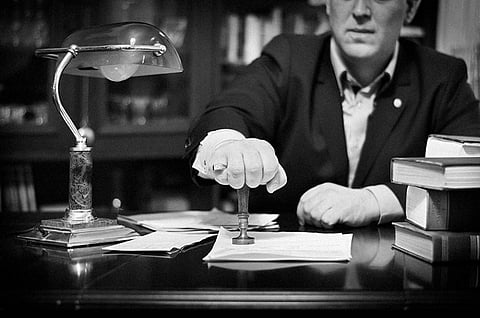
- Locations
- Interviews
- Luxury Home
- Luxury Lifestyle
- Luxury Travel
- Events
- More
- Magazine
- Contact
- Media Kit

"By the time Garrison shot his girlfriend's father, Angus, Angus had already been dead for hours. Poisoned. Perhaps by his daughter – a chemist at Oxnad Pharmaceuticals. Perhaps by his wife who'd also been reported missing the very same evening. Whether his wife is a suspect or a possible victim is as of yet uncertain. Speculation abounds as newer anonymous sources claim that Lang died as a result of a meticulously planned suicide – one made to look like a homicide in an effort to allow his remaining family to collect on his life insurance policy. Though Lang had a history of depression, the allegation has yet to be confirmed. At present, police say, all options remain on the table."
Fatalities pique our interest. Those resulting from crimes get our full attention. Whether morbid curiosity, human concern or a desperation to avoid a similar fate, stories about unsolved murders abound. They are a perpetual draw. The need to know is so overwhelming that forensic scientists spent years figuring out who was behind the murder of Otzi, a 5,300-year-old corpse discovered in an Alpine glacier. 'How did he die? How did his body get here? Who killed him?' We obsess over unnatural death as if our own mortality depended on answers. We review facts as if awareness could help us gain control over our destiny.
A perfect crime demands a morally imperfect but ingenious person. As G.K. Chesterton wrote, "The criminal is the creative artist; the detective only the critic. As for the best crime writers, they need both and more – the ability to dream like criminals while having a detective's knack for deductive reasoning. In addition, true crime writers are seasoned murderers, eveready to kill their own darlings.

In feature articles, documentaries, films, novels, and games, murders abound. Whether horror, thriller, who-done-it, drama or dark comedy, murder is fertile soil for development. But for all the many mediums and genres to employ 'mysterious murders,' few foster the kind of creative environment necessary for coming up with such a story. This shortcoming extends even to the puzzle-solving gaming industry. Crimewriters is the exception to the rule.
Besides being an entertaining and sociable table-top game. Crimewriters catalyzes creativity. It helps players generate immersive stories with fleshed-out complex characters – ones whose resolution remains obscure until the final twist.

Since the only limits are the ones set by the respective imaginations of each player, Crimewriters never runs the risk of becoming repetitive or formulaic. Created by Ádám Vágó & Bori Mészáros – a highly gifted duo whose mutual backgrounds span graphic design, photography, painting, writing and art education – the game inspires thinking and personal nuances. Rather than being a game-of-chance, the cards in this particular series help players fabricate quirky, unexpected and wild stories. Like the mechanics of the game, the visual look and feel doesn't help one discover a solution or guide one in a certain direction. Quite the contrary, the cards are aesthetic and thought-provoking. They entice players into free-association by forcing them to finding connections between otherwise disparate symbols.
Players attempt to guess one another's story's development in the same way viewers and readers regularly attempt to guess the outcome of novels and films after reading a blurb or seeing an ambiguous trailer. Relying on a counterintuitive strategy, Crimewriters demands none of the usual puzzle-solving deductive logic present in most ordinary crime games. Rather, it demands an understanding of a specific storyteller's creative process. As for how the winner is determined: the criteria are similar to the ones used when judging a successful crime novelist or screenwriter. Winners are those who create a coherent universe (in this case, those who use all the words and phrases their cards demand) while nevertheless writing a unique enough story that others can't guess what will or did happen. In short, the winner is the one able to keep the audience hooked for the longest time while remaining enigmatic and unpredictable.

In a sense, Crimewriters is a writing lab workshop as much as it is an adventure. It's a journey through the narrow streets of a criminal's hometown, and an encounter with the odd creatures that inhabit the imaginations of our friends.' If you think the criminal mind is frightening, just wait till you've been introduced to the criminal alter-ego invented by the mind of someone you know.
The notorious sociopath, Charles Manson once boasted: "The game is mine. I deal the cards." Tellingly, he made the delusional comment from a jail cell where he was thankfully interred for the remainder of his life. When it comes to Crimewriters the game does not belong to those who deal. It belongs to those who can use the cards to find their own talent. While we've all the heard the adage 'Crime doesn't pay,' Crimewriters pays in dividends – it builds an understanding of the inner arsenal of creativity we store within us. It familiarizes us with our trigger-happy creativity that stands ready to fire-off round after round of killer associations. With all the digital information out there, all the films openly available, all the mash-ups, remixes and endless buzz of up-to-the-minute news, it's about time someone came up with a game capable of rebooting our own imaginations.
For further information click below:
CRIMEWRITERS – US & Int. version
